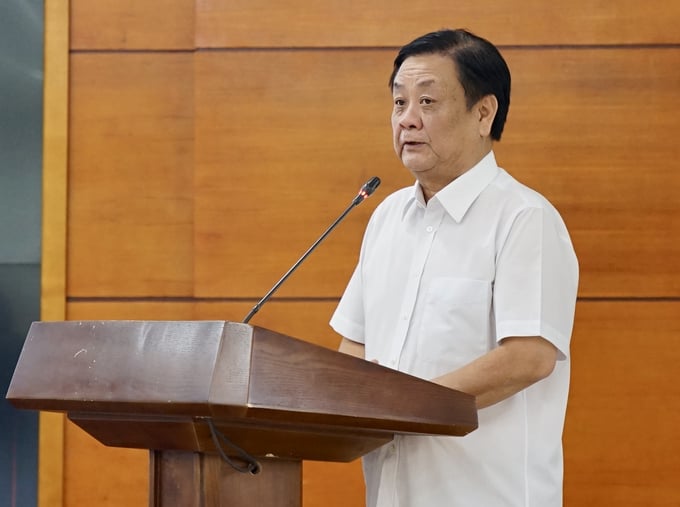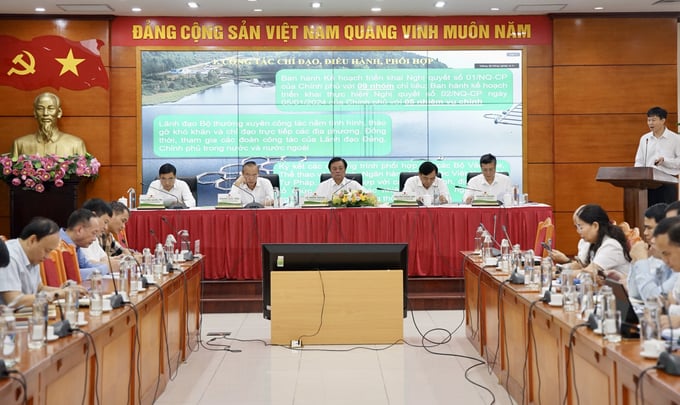May 20, 2025 | 15:17 GMT +7
May 20, 2025 | 15:17 GMT +7
Hotline: 0913.378.918
May 20, 2025 | 15:17 GMT +7
Hotline: 0913.378.918

Minister Le Minh Hoan delivered a speech at the Mid-year Review Conference and outlined the tasks for the latter six months of 2024 for the Ministry of Agriculture and Rural Development on the morning of July 5.
During the Mid-year Review Conference on task deployment for the second half of 2024 organized by the Ministry of Agriculture and Rural Development (MARD) on July 5, Minister Le Minh Hoan stated that "production will reach its maximum capacity, and land utilization will also reach its limit." Hence, without embracing a different mindset, the agriculture industry will be unable to advance any further. In the present flourishing era of artificial intelligence, the agriculture sector requires a strategy to acquire more sophisticated digital technology.
"It is often advised to prioritize working smart over working hard, and the best approach is to leverage established platforms such as ChatGPT, or other artificial intelligence tool for advancement. This would be a direction that provides guidance for the agricultural industry", Minister Le Minh Hoan stated.
He stressed the need of connectivity, asserting that it is a prevailing pattern for the agriculture industry to enhance exports. The Minister is certain that addressing the concerns of agricultural workers and consistently improving work practices will lead to a steady improvement in agricultural achievements. This progress is expected to be obvious in the rapid growth observed in the first six months of 2024, setting the stage for a breakthrough year in 2025. Nevertheless, he maintains the conviction that there is a considerable amount of work yet to be accomplished in order to achieve sustainable agricultural development.
Pham Duc Luan, the Director of the Department of Embankment and Disaster Prevention, has reported that their unit has been actively monitoring the development of disasters, promptly implementing measures to minimize damage, and swiftly restoring production to stabilize the livelihoods of the people. In 2024, he oversaw the implementation of programs to safeguard vulnerable embankments in provinces and cities, ranging from level III to exceptional levels.Sorry, but I need more information to provide a response. Can you please provide the text you would like me to rewrite?
During the initial half of the year, natural calamities resulted in 51 fatalities and missing persons, along with economic damages valued at more than 877 billion dong. Mr. Luan states that while economic losses have declined, there has been an increase in both casualties and agricultural production. He predicts that natural calamities would grow increasingly intricate from now until the year's end, emphasizing the need for collaboration among agencies and localities to prioritize production direction.
Nguyen Tung Phong, the Director of the Irrigation Directorate, addressed two significant concerns related to irrigation. The results of the winter-spring operation were effectively coordinated with the Vietnam Electricity Group's water release in two phases to support the winter-spring rice planting plan in the Central Highlands and the Red River Delta. The total water release for both phases was 2.78 billion m3, achieving 99% of the planted area.
The Department has confirmed that the predicting of saline intrusion in the Mekong Delta has significantly improved in recent years, particularly in 2014, 2016, and 2020. Under the leadership of the Ministry and with the advise of the Department, efforts are made to ensure stable agricultural production by implementing strategies such as early seedling conversion and mitigating the impact of weather changes.
Despite adverse meteorological circumstances such as severe cold spells and sustained cold in northern regions, as well as heatwaves, droughts, and salt intrusion in southern and Central Highlands provinces, production and cultivation yielded acceptable outcomes. The crops exhibited robust growth, resulting in a substantial increase in yields. These enhanced yields were sufficient to fulfill the requirements of domestic consumption, as well as to cater to the demands of processing for animal feed and exportation.
Across the country, there are concentrated endeavors to cultivate, nurture, and gather rice and decorative plants during the winter-spring season. In the southern areas, there are also strategies in place for cultivating rice during the summer-autumn and autumn-winter seasons. The country cultivated 5.03 million hectares of land, which is a 0.9% increase compared to the same period last year. The harvested area amounted to 3.48 million hectares, showing a 0.5% increase. The average yield per hectare was 67.1 tons, which is a 0.7 ton increase. The total harvested production reached 23.3 million tons, indicating a 1.6% increase. Out of this, the winter-spring crop accounted for 20.3 million tons, showing a 0.7% increase.

Minister Le Minh Hoan (seated in the middle) presides over the conference along with Deputy Ministers.
The initiative titled "Sustainable Development of 1 Million Hectares of High-Quality Rice and Low Emission Linked to Green Growth in the Mekong Delta Region by 2030" has garnered significant government and popular interest.
Deputy Minister Phung Duc Tien stated that this year has been challenging in terms of meteorological conditions. However, thanks to precise forecasting and efficient databases, the productivity in the rice, cattle, agricultural, and forestry sectors is being bolstered by robust irrigation infrastructure.
Deputy Minister Phung Duc Tien expressed confidence in the excellent outcome of exports during the first half of the year, with a target of $54 billion. Nevertheless, the agricultural industry continues to encounter obstacles, particularly in the realm of crop cultivation. This necessitates the creation of designated areas for raw materials, the implementation of source tracing, and the formation of economically sustainable chains. It is necessary to take into account the establishment of specialist farming zones, drawing from the experience of Europe. In addition, the expansion of road and railway border crossings, as well as the implementation of smart borders, has considerable potential and enormous chances for increasing exports.
Deputy Minister Hoang Trung advised the Crop Production Department to actively encourage units to consistently apply technical solutions and develop strategies for future rice seasons in order to meet end-of-year objectives.
Experts and local communities have been more concerned about soil health. Deputy Minister Hoang Trung suggested that the Plant Protection Department and Crop Production Department work together to create guidelines and strategies for the management of soil health and nutrition in order to promote sustainable crop cultivation.
Ensuring the protection of production areas is of utmost importance in the field of plant protection. To tackle the significant increase in pest infestations, particularly in the mountainous provinces of the north, Deputy Minister Hoang Trung suggested the establishment of inspection teams and the improvement of forecasting methods in this field.
Furthermore, it is strongly recommended that the Plant Protection Department and the Department of Animal Health work together to efficiently supervise and control plant quarantine systems, ensuring the detection of unauthorized imports and deceitful claims of origin. The Department is advised to prioritize and enforce strict regulations on agricultural commodities, including seeds, plant protection products, and fertilizers.
Translated by Dieu Linh

(VAN) In 2024, over 295 million people across 53 countries and territories faced acute hunger—an increase of almost 14 million people compared to 2023, while the number of people facing catastrophic levels of hunger reached a record high.

(VAN) World Environment Day 2025 (June 5) carries the theme 'Beat Plastic Pollution' continuing to emphasize the global urgency of addressing the plastic waste crisis.

(VAN) This was the assessment shared by experts at the workshop titled 'Assessing the Role and Potential of Low-Emission Rice Production Systems in Vietnam,' held on the morning of May 19.

(VAN) Cai Rong Port is the fisheries control center of Quang Ninh, helping to monitor fishing vessels, combat IUU fishing, and remove the EC's 'yellow card'.

(VAN) The German Agricultural Society (DLG) explores the possibility of establishing a mechanization service center in Vietnam’s Mekong Delta to support farmers in accessing and utilizing advanced machinery.

(VAN) On May 16, the Department of Water Resources Management, in collaboration with the Food and Agriculture Organization of the United Nations (FAO), held a signing ceremony for the GEF-8 project document.

(VAN) Food safety, mechanization, vocational training, and market opening are key areas of cooperation expected between the Vietnamese Government and the Federal Republic of Germany.